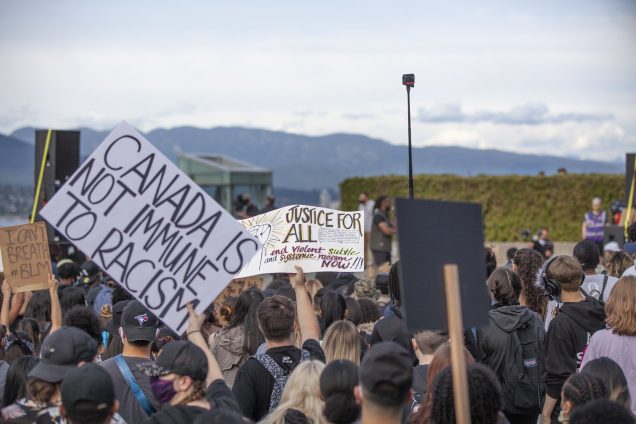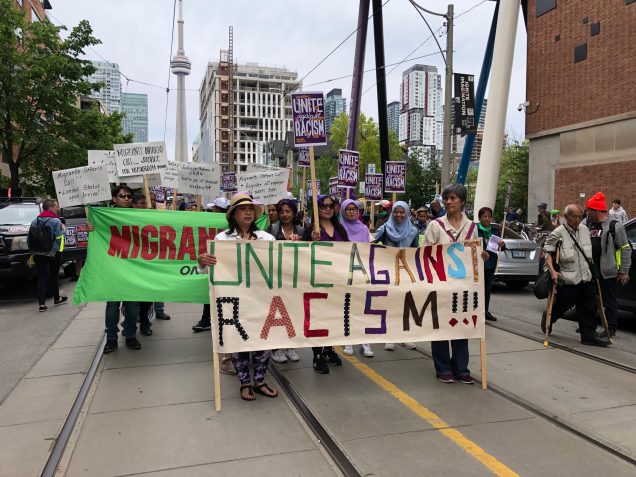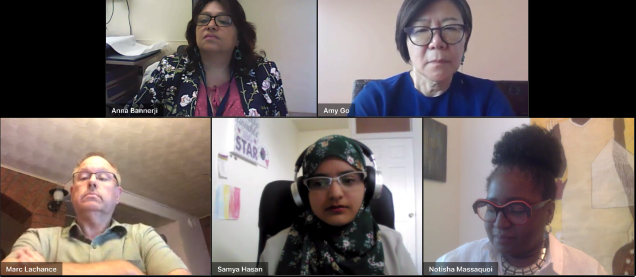Collect race-based data to address racial inequalities
Collect race-based data to address racial inequalities

Black Lives Matter protest in Toronto. (Photo: GoToVan/Flickr)
NGO’s urging federal, provincial government
By Marites N. Sison
A network of NGOs is urging federal and provincial governments to make a “solid commitment” to collect race-based data across Canada as a first step in addressing racial inequities in all its forms and in all sectors, especially in health care.
“Race-based data is really critical to understand the playing field and who gets what,” said Dr. Anna Banerji, Continuing Professional Development Chair for Indigenous and Refugee Health, at the University of Toronto’s faculty of medicine. “It amplifies the systemic biases in our system, the biases in access and privilege.”
However, data alone will not address systemic racism, said Banerji in a webinar held June 22 by Colour of Poverty-Colour of Change, a network of NGOs working to “address and redress structural and systemic ethno-racial inequality.”
What’s important, said Banerji, is that “we use that (race-based data) for the implementation of fair and equitable policy.” Even if race-based data is collected, “unless we address racism and systemic discrimination, then we only have half the solution,” she added. Data should explain, for example, why disparities exist and what can be done to reduce them. “We need to dig deeper.”

Filipinos in Toronto take part in an anti-racism rally in 2019.
(Photo: Marites N. Sison)
Disaggregated race-based data collection should be mandatory for all social indicators of well-being,” said Samya Hasan, executive director of the Council of Agencies Serving South Asians, and moderator of the webinar. While some public health units in Ontario are “sporadically starting to collect some data,” these are not coordinated with the federal government, she said.
Academics and social justice advocates have long argued that “inequity by race” exists in Canada, and that this plays a major role in one’s health outcomes, economic status, education, and other social and economic indicators.
Demands for race-based data — long articulated by many social justice activists — have gained traction in recent months as a result of the Covid-19 pandemic, and amid large-scale protests against racism triggered by the killing of African-American George Floyd by a white police officer in Minneapolis May 25, and the death of African-Canadian Regis Korchinsky-Paquet, who fell from a 24th-floor balcony in Toronto May 27.
While provinces and territories have not reported ethnicity-based Covid-19 data, Dr. Theresa Tam, Canada’s Chief Medical Officer has acknowledged that outbreak clusters show that the coronavirus is having a “disproportionate impact” on racialized and marginalized populations in the country. “COVID-19 has exploited social and economic vulnerabilities and inequalities across Canadian society, taking hold in settings and among communities that experience overcrowding, lower incomes and health disparities,” she said. Filipinos, many of whom work in the frontlines as staff in the healthcare and service industries, have been among those affected by the pandemic.

Speakers at the Colour of Poverty-Colour of Change webinar, Race Matters: Now Make it Count
In response to growing calls for race-based data and “in an effort to detect inequities in the toll of the pandemic,” Manitoba on May 12 became the first province to track the ethnicity of its Covid-19 patients, the Globe and Mail has reported. “Unless you collect that data, you’re not going to know,” said Manitoba’s Chief Public Health Officer, Brent Roussin. Quebec and Ontario also announced similar plans.
Toronto has also started gathering race-related pandemic data, which experts say, will help focus public health messages, testings and critical interventions to communities that need them the most.
Earlier, Dr. David Williams, Ontario’s chief medical officer of health, said it was not necessary to collect race-based statistics because the World Health Organization did not find any group to be of particular risk to Covid-19. “Right now we consider our main risk groups (to be) the elderly, those with other co-morbidities, regardless of what race they are,” he said. “Regardless of race, ethnic or other backgrounds, they’re all equally important to us.”
Ontario Premier Doug Ford, for his part, cited privacy reasons.
However, the issue of privacy is “not something that cannot be worked out and worked around,” said Notisha Massaquoi, co-chair of the anti-racism panel for the Toronto Police Services Board. Race-based data can still be gathered while ensuring people’s personal information is protected and that there are no identifiers when data is released, she said.
Meanwhile, Toronto’s Special Investigations Unit (SIU) told CBC News that starting this fall, it will start collecting data on race, ethnicity, and religion of complainants and police officers who are the subject of its investigations. The SIU is a civilian law enforcement agency which investigates incidents involving police officers where there has been death, serious injury or allegations of sexual assault.
The SIU’s decision is “an important and historic step forward,” racial justice laywer Anthony Morgan, who manages the City of Toronto’s Confronting Anti-Black Racism Unit, told CBC News. But he stressed that this was “not happening out of the goodwil of the SIU or any politician, but “comes of of struggle; it doesn’t come out of the benevolence of the system.”
In 2018, the Liberal government created the Centre for Gender, Diversity, and Inclusion Statistics, and said it would have a particular focus on Black Canadians. However, the centre has not been fully operational. It is also in need of more funding to be able to “effectively provide information on Canada’s diverse Black population, understand how it’s doing, and create policy to address inequality,” said Malinda Smith, an academic advisor on Statistic Canada’s Expert Working Group on Black Communities in Canada, and on immigration and ethocultural statistics. Canada’s “very poor” disaggregated data makes it difficult to address systemic racism, Smith told The Hill Times. “You can’t address them without good data. It doesn’t get measured, it doesn’t get done.” She added: “My view is any politician, policy maker, university president making a statement about commitment to address anti-racism and yet are not collecting data, are not consulting the Black population, I think those commitments, those statements become meaningless.”
Systemic racism in long-term care
Meanwhile, Amy Go, president of the Chinese Canadian National Council for Social Justice, told the webinar about the “systemic inequities” that she said exists in Ontario’s long-term care (LTC) sector. Even in the absence of race-related data, the pandemic has shown that majority of the residents in the province’s long-term care institutions are White, Caucasian, English-speaking seniors, while the frontline staff are mostly People of Colour (POC), she said.
There are only a few LTC homes that provide “culturally-appropriate care,” said Go. “The reason is the sector has not been responsive to the needs of racialized seniors, particularly those who don’t speak English, whose cultural practices are not being addressed and recognized in these homes.”
Go noted that while the Long-Term Care Homes Act stipulates that LTC homes must be responsive to the needs, including the cultural and spiritual practices of their residents, this hasn’t been followed. Ontario has “paid lip service” to this mandate, she said. “There is no real teeth and no real monitoring mechanism” to make sure that they are really practiced.
“Long-term care is publicly-funded, so data is important,” she stressed. “Why don’t racialized people go to long-term care homes, even as a last resort? What’s accessible to racialized sneiors? Who are getting publicly-funded care or not?”
Go also stressed the importance of addressing the fact that “control and decisions” about policies that can address racial inequities are still “in the hands of a few White men. It’s important to know who’s in control, who’s making decisions that affect the delivery of care. There must be equitable representation,” she said.
Disaggregated race-based data “helps illustrate disparities and provides a rationale for immediate and coordinated action to address racial inequity,” stressed Hasan. “We know that even within the same community, same racialized communities, there are unique lived experiences,” she said. “There are differences in how poverty is experienced. Even within the same racialized communities, we can have variances in terms of the poverty people are facing, we can have variances by ethnicity, by gender, by age, and other biological and social identity.”
Transparency in data-gathering
Other speakers in the webinar emphasized the importance of gaining the trust and confidence of communities when gathering race-based data. Some communities may refuse to disclose their race out of fear, or because they don’t think they will benefit from it, they said.
“There have been a lot of harm done in the past, especially with research done on Indigenous peoples without their consent, or knowledge,” said Banerji. She noted how, because of systemic racism, “there’s a perception that someone would be treated differently if their race was disclosed.”
She added that “usually the research benefits the outsiders that go in and do the research and lead to their PhD, but the communities don’t benefit.”
She noted how there’s already so much data that states that clean water is good for one’s health, “and yet we still currently have 56 First Nation communities that don’t have access to clean water.” The question that needs to be asked, she said, is “how are data being used or not in designing healthcare for Indigenous populations?”
Go said it was important to be transparent about the intent of collecting data, and results need to be reported publicly. “There has to be public accountability. It should not be a one-off, but part of a bigger commitment.”
The need for disaggregated, race-based data in Canada has long been raised, not just by activists, but even by the United Nations Working Group of Experts on People of African Descent. In 2017, it released a report based on a visit to Canada, which noted a “a serious lack of race-based data and research, which could inform prevention, intervention and treatment strategies for African Canadians.” It also said that Canadian authorities acknowledged that “disaggregated data along racial and ethnic lines was necessary to understand the human rights concerns of African Canadians.”
Organizations like Colour of Poverty-Colour of Change have also developed research and organizational programming tools-templates to help groups, governments, service providers, institutions and other groups gather, monitor and analyze disaggregated data.
Ontario’s Human Rights Code already permits the collection and analysis of race-based data provided they are collected for purposes such as to monitor discrimination, identify and remove systemic barriers, address historical disadvantage andpromote substantive equality.”
Comments (0)